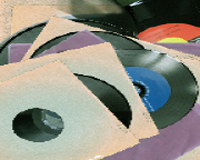 Several years ago, I was lucky enough to be in the right place at the right time and score a job at Gramaphone Records (Chicago).
Several years ago, I was lucky enough to be in the right place at the right time and score a job at Gramaphone Records (Chicago).
I imagine that every young DJ or music enthusiast that spent hours flipping through the store’s aged bins dreamed of being paid to spend time there, hang out, listen to great music, and never appear to be working too hard.
I was certainly one of them, having begun my lifelong search for the newest in downtempo and hip hop in 1995. Never did I think that almost ten years later I would be one of the few, the envied. I became Gramaphone’s hip hop buyer, one of the store’s largest and most profitable sections.
My favorite memories are, strangely enough, of working slow Monday and Tuesday evening shifts. During this stretch between the hectic weekend and the arrival of new releases on Thursday, there might be only one or two customers in the store. Sometimes none at all.
At one point in the night, some veteran employee would begin to pine for the days when the store was always packed and hot 12” single sales numbered in the hundreds and not the tens. It was usually the manager, Andy, a former DJ old enough to have been there in the salad days of house, who would start reminiscing about the Chicago music scene — shady record label owners, coke-fueled DJ shenanigans, who got rich off what record, and how the Hot Mix 5 and WBMX ruled the world.
One of us would egg him on, and before you knew it we’d be gathered around him like children at the feet of a raconteur grandfather, rapt and wide eyed. As the new guy, these oft-told tales were usually repeated for my benefit.
To music fans, and especially dance music fans, Gramaphone is as much a Chicago institution as the Field Museum or Comiskey Park.
Gramaphone had its own lore as well. I was regaled with tales of the days of certain employees making thousands of tax-free dollars a week from mixtape sales, with others doing a panoply of drugs in the back room during business hours. One of my favorite stories (and one that gets told to all new employees) falls into the store’s “Least Competent Criminal” file.
House legend Derrick Carter was doing a gig one night when someone stole a couple bags of records from him. The thief obviously didn’t know who he was messing with, as he thought it a good idea to take the records to Gramaphone to fence.
Now, Derrick used to work at Gramaphone, so the G-phone staff was, of course, one of first to be asked to be on the lookout. It only took minutes for the Gramaphone staff to recognize the pillaged wax, return it to Derrick, and bring the miscreant to justice.
As the hip hop guy, I was probably supposed to be excited to meet Talib Kweli or Royce da 5’9”, but I found it cooler to be rubbing elbows (literally — that store was small) with Cajmere, Frankie Knuckles, and Derrick Carter. In a way, Gramaphone was their house and I was just a guest, and their presence inspired reverence and respect in me.
I’ll always cherish the two years I spent working there. Not just because of the fun people, relaxed atmosphere, and endless records, but because I’m a part of history. To music fans, and especially dance music fans, Gramaphone is as much a Chicago institution as the Field Museum or Comiskey Park.
Of all the renowned, successful dance music stores that thrived in the heyday of vinyl, Gramaphone is among the only ones left, and it’s going the strongest. It’s one of the few locales that serves as a reminder of the rich cultural heritage that house music has provided for not only Chicago, but the entire world. I got a chance to contribute and make my mark there — a chance very few others get.
When it eventually closes its doors, everyone who loved Gramaphone like I do will sit around and tell their tales of what the store meant to them. I’ll be there, and maybe I’ll get my opportunity to tell a young new jack what it was really like at Gramaphone back in the day.
It’s one thing to read about labels like Trax or Cajual in a book; it’s entirely another to hear the real story — or at least a lovingly embellished rumor.
– Nate Vanek
Nate Vanek is a DJ, vinyl collector, and bedroom producer who still gets asked questions by customers when shopping at Gramaphone.

Talib Kweli is a way better MC than Mos Def.